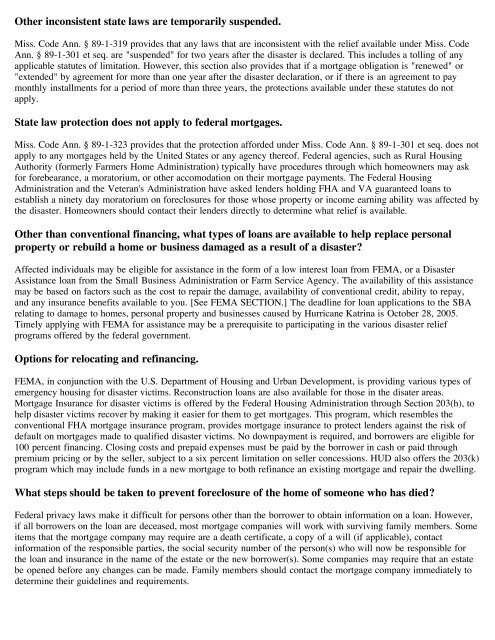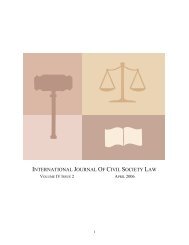Hurricane Katrina: Legal Issues - Columbus School of Law
Hurricane Katrina: Legal Issues - Columbus School of Law
Hurricane Katrina: Legal Issues - Columbus School of Law
You also want an ePaper? Increase the reach of your titles
YUMPU automatically turns print PDFs into web optimized ePapers that Google loves.
Other inconsistent state laws are temporarily suspended.<br />
Miss. Code Ann. § 89-1-319 provides that any laws that are inconsistent with the relief available under Miss. Code<br />
Ann. § 89-1-301 et seq. are "suspended" for two years after the disaster is declared. This includes a tolling <strong>of</strong> any<br />
applicable statutes <strong>of</strong> limitation. However, this section also provides that if a mortgage obligation is "renewed" or<br />
"extended" by agreement for more than one year after the disaster declaration, or if there is an agreement to pay<br />
monthly installments for a period <strong>of</strong> more than three years, the protections available under these statutes do not<br />
apply.<br />
State law protection does not apply to federal mortgages.<br />
Miss. Code Ann. § 89-1-323 provides that the protection afforded under Miss. Code Ann. § 89-1-301 et seq. does not<br />
apply to any mortgages held by the United States or any agency there<strong>of</strong>. Federal agencies, such as Rural Housing<br />
Authority (formerly Farmers Home Administration) typically have procedures through which homeowners may ask<br />
for forebearance, a moratorium, or other accomodation on their mortgage payments. The Federal Housing<br />
Administration and the Veteran's Administration have asked lenders holding FHA and VA guaranteed loans to<br />
establish a ninety day moratorium on foreclosures for those whose property or income earning ability was affected by<br />
the disaster. Homeowners should contact their lenders directly to determine what relief is available.<br />
Other than conventional financing, what types <strong>of</strong> loans are available to help replace personal<br />
property or rebuild a home or business damaged as a result <strong>of</strong> a disaster?<br />
Affected individuals may be eligible for assistance in the form <strong>of</strong> a low interest loan from FEMA, or a Disaster<br />
Assistance loan from the Small Business Administration or Farm Service Agency. The availability <strong>of</strong> this assistance<br />
may be based on factors such as the cost to repair the damage, availability <strong>of</strong> conventional credit, ability to repay,<br />
and any insurance benefits available to you. [See FEMA SECTION.] The deadline for loan applications to the SBA<br />
relating to damage to homes, personal property and businesses caused by <strong>Hurricane</strong> <strong>Katrina</strong> is October 28, 2005.<br />
Timely applying with FEMA for assistance may be a prerequisite to participating in the various disaster relief<br />
programs <strong>of</strong>fered by the federal government.<br />
Options for relocating and refinancing.<br />
FEMA, in conjunction with the U.S. Department <strong>of</strong> Housing and Urban Development, is providing various types <strong>of</strong><br />
emergency housing for disaster victims. Reconstruction loans are also available for those in the disater areas.<br />
Mortgage Insurance for disaster victims is <strong>of</strong>fered by the Federal Housing Administration through Section 203(h), to<br />
help disaster victims recover by making it easier for them to get mortgages. This program, which resembles the<br />
conventional FHA mortgage insurance program, provides mortgage insurance to protect lenders against the risk <strong>of</strong><br />
default on mortgages made to qualified disaster victims. No downpayment is required, and borrowers are eligible for<br />
100 percent financing. Closing costs and prepaid expenses must be paid by the borrower in cash or paid through<br />
premium pricing or by the seller, subject to a six percent limitation on seller concessions. HUD also <strong>of</strong>fers the 203(k)<br />
program which may include funds in a new mortgage to both refinance an existing mortgage and repair the dwelling.<br />
What steps should be taken to prevent foreclosure <strong>of</strong> the home <strong>of</strong> someone who has died?<br />
Federal privacy laws make it difficult for persons other than the borrower to obtain information on a loan. However,<br />
if all borrowers on the loan are deceased, most mortgage companies will work with surviving family members. Some<br />
items that the mortgage company may require are a death certificate, a copy <strong>of</strong> a will (if applicable), contact<br />
information <strong>of</strong> the responsible parties, the social security number <strong>of</strong> the person(s) who will now be responsible for<br />
the loan and insurance in the name <strong>of</strong> the estate or the new borrower(s). Some companies may require that an estate<br />
be opened before any changes can be made. Family members should contact the mortgage company immediately to<br />
determine their guidelines and requirements.

















